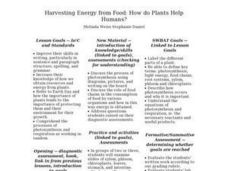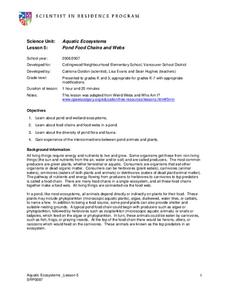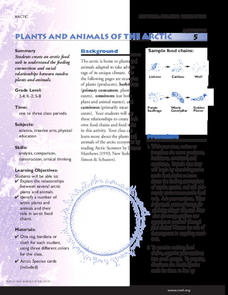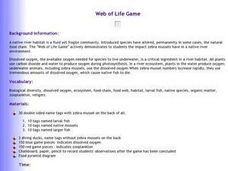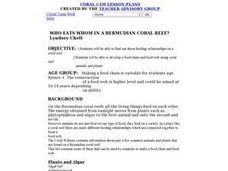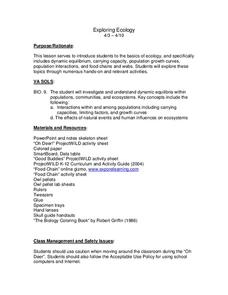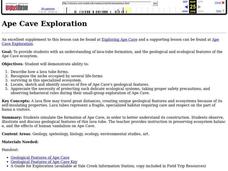Curated OER
What's for Dinner?
Students investigate the dietary habits of living organisms by creating a model food chain. In this food web lesson, students define several food chain vocabulary words such as omnivore, carnivore and herbivore. Students utilize...
Curated OER
Web of Life
Learners collect information about various organisms in a forest ecosystem and create a mural that depicts organism interdependence. They then simulate a food web using a ball of string.
Curated OER
Harvesting Energy from Food: How do Plants Help Humans?
Beginning botanists view slides of plant vascular tissue. They watch Magic School Bus Gets Planted, which you can find online, and then write a summary of what they have learned about plants. This lesson could be used with upper...
Curated OER
Aquatic Ecosystems
Students study ponds and wetland ecosystems and examine the food chains and webs in them. In this aquatic ecosystems lesson plan students answer questions about the diversity of the flora and fauna in a pond.
Curated OER
Six Levels of Ecological Organization
Ninth graders describe the six levels of ecological organizations and give examples of each. They also differentiate between food chains and webs and identify trophic and consumer levels in food chain and food webs.
National Wildlife Federation
Plants and Animals of the Arctic
The Arctic food web may be more limited than other environments, but it has all the same components. With an interactive activity, pupils assume the roles of the components of an Arctic food chain. They move around and link themselves to...
Scholastic
Study Jams: Symbiosis
Three types of symbiosis are explained: parasitism, commensalism, and mutualism. This is done with colorful animation and lively dialogue in a straightforward and easy-to-follow manner. Have your ecology class watch this at home and then...
Curated OER
What Lives in Water?
In this early childhood science worksheet set, students study the importance of water, and determine the difference between themselves and water dwellers. They look at adaptations, river life, rainforest life, food chains, pollution, and...
Curated OER
Up the Down Tree House
Students investigate the decomposition process. In this ecology lesson, students participate in a play, "Up the Treehouse" where the main idea focuses on a decomposing tree and how food chains are effected by decomposition. After the...
Curated OER
The Web of Life
Young scholars describe the importance of having a balance ecosystem. After a brief lecture, students give an explanation of the properties of an ecosystem. They create a web, using yarn which shows how the various members of the...
Curated OER
Plankton
Students research phytoplankton and zooplankton. In this food chain lesson, students read This is the Sea That Feeds Us and discuss plankton, food chains, and webs. Students define phytoplankton and compare them to land plants. Students...
Curated OER
Lesson 9 - Along Our Coast
Learners study the benefits of estuaries. They construct a saltwater food web, and complete worksheets and a quiz.
Curated OER
The Food Web
Students explore the role that the Arctic hare plays in the Canadian Arctic food web.
Curated OER
Web of Life Game
Learners participate in a web of life game. After reviewing new vocabulary, they play each round of the game and discuss the changes that occured in the last round. They are to survive in the game as long as possible given the...
Curated OER
9th Grade
Ninth graders discuss the principal source of energy entering the marine ecosystem. They name some of the autotrophs at the Maui Ocean Center. Students name some of the heterotrophs at Maui Ocean Center. They are taught that plants are...
Science Matters
Crawly Composters
Get your hands dirty with an interactive lesson that showcases the process of decomposing and returning nutrients back into the soil. After building a compost pile, pupils regularly observe the ways worms help with changes to the soil...
Curated OER
Who Eats Whom in a Bermudian Coral Reef?
Young scholars will be able to find out about feeding relationships on a coral reef. They then will be able to develop a food chain and food web using coral reef animals and plants using the Coral Website.
Curated OER
Exploring Ecology
Students explore the basics of ecology through numerous hands-on and relevant activities. They participate in an online food chain demonstration, which explores food web dynamics. They dissect owl pellets, examine the prey's bones, and...
Curated OER
Food Chain
In this science worksheet, students match the words given in the first column with the correct definition found in the second column. There are six vocabulary terms to define.
Curated OER
The Macaroni Lab
Pupils are given an introduction to the "ecosystem", what factors make up an ecosystem (biotic factors, abiotic factors, food chain, producers, consumers and decomposers) and how those factors interact.
Curated OER
Along Our Coast
Students explore the coast lines of Florida. They examine the benefits of estuaries and examine the estuary systems found along the coast. Students research and construct a saltwater food web.
Curated OER
Ape Cave Exploration
Pupils simulate online the formation of Ape Cave, in order to better explain its construction. They observe, illustrate and discuss geological features of this lava tube.
Curated OER
Food and You
Learners identify why humans are dependent on natural resources and the problems associated with their use and demonstrate how humans affect their environment. They also describe the different components and natural resources that go...
Curated OER
Wild Arctic
Students explore key terms, including food web and food chain. They discuss Arctic plants and animals, devise at least three Arctic food chains and create a food web showing connections among Arctic life.
Other popular searches
- Food Webs and Chains
- Ecology Food Webs Chains
- Food Webs and Food Chains
- Ocean Food Chains and Webs
- Food Webs Chains
- Food Webs Food Chains
- Food Webs, Food Chain




